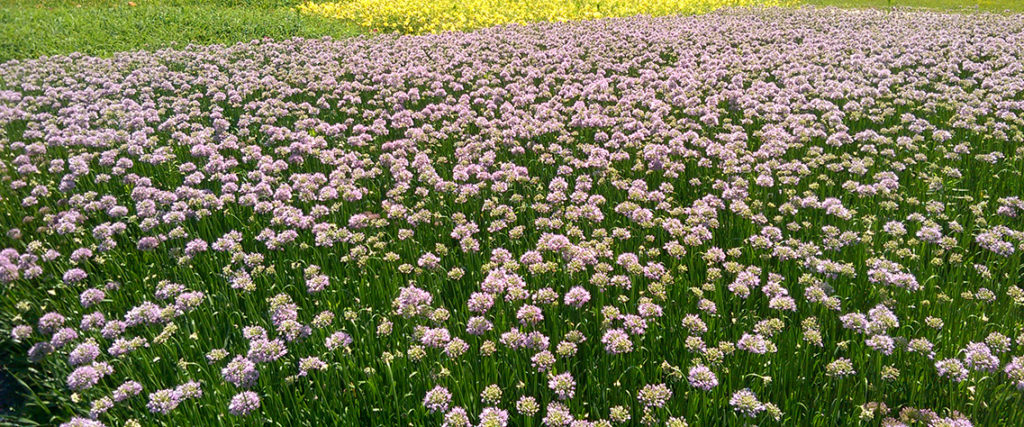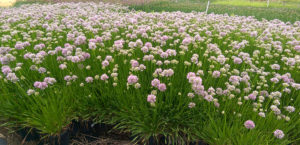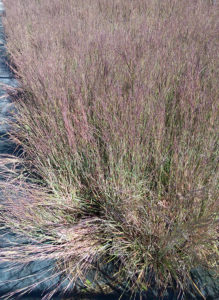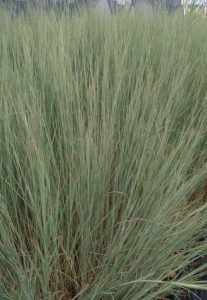
Many strange things happen in the nursery business and one of the stranger things is ornamental onions—who would have thought. I was out of the nursery business for a few years thinking that I was going to retire and write books and that everyone would love me and now I am back in the thick of things, love is not happening much, and now one of our main plants is alliums. The good thing about Allium ‘Summer Beauty’ is the fact that it does not self-seed. The bad thing about Allium ‘Summer Beauty’ is that I have 12,000 heavy clumps out in the field that I am in love with and do not want to plow under. They are growing more every year and taking up room and at 25 splits to the clump they would make 300,000 plugs which is way too much for anyone to have, let alone attempt to sell. The 25 splits per clump is conservative for a five year old clump and so I probably have half a million potential plants.

Even though this plant has been around for only a few years it has already acquired several names. Some call it “Allium Tanguiticum” and some call it “Allium senescens var. montanum ‘Summer Beauty’. We could have predicted that. We could also have predicted that everyone and their dog is breeding, selecting, promoting, and otherwise muddying the waters with new names for new plants. We list ten varieties of alliums with several more in the program for rapid building up of stock. Our goal is to do with all of these new varieties exactly what we did with ‘Summer Beauty’. We will keep you posted on how this making too many is going.
While we do not have a reputation for being a bare root field grower of anything, some days we can be talked into it. It works best if these field rows are dug when the ground is not frozen. We are neither organized nor capitalized enough to have a large cooler, and so we cannot treat these plants like professional field growers do. We live close enough to Walters Gardens to see how people do things who know what they are doing. We do not know what we are doing. By the way, the blurbs on the internet who are promoting alliums say this: “Great value as a source of pollen and nectar for honey bees, bumble bees, native bees, and butterflies”. If you think a few alliums in the front yard will make the world a better place, then more power to you and think of us.
After this attempt at blatant commercialism we are switching the topic to shipping stories. Things happen in the spring and the best story so far this spring has to do with the gallons of ornamental grasses that were rejected and sent back to us because they were “too wet”. When they got back to our dock they looked about normal and so we are puzzled. The message was relayed through a truck driver and so things might have gotten muddled along the way. We still cannot figure out what could have happened. We suspect that our customer had a potential customer who cancelled on them and so they rejected part of the load and had to come up with a quick excuse on the spot, something at least good enough to confuse the truck driver as that is all that was needed. It worked. Most days we tell ourselves that the customer is always right. Some days we want to tell the customer that they should find another supplier who really believes in that slogan as we are getting jaded.

Selling ornamental grasses this time of the year is tricky. We have been opening doors and venting to keep new growth from happening. We think that sending out tender plant material when it will get frosted is not the right thing to do. On the other hand, it is difficult to tell a dormant grass plant from a dead grass plant. They both have a good, well-developed root system and many nice dormant stems and a colorful plastic tag. These days we are over-wintering all of our grasses under poly and so the survival rate has gone way up from when they were left outdoors. Still, today, we saw a few miscanthuses on the loading dock that were dead. It took a lot of pulling and pushing and digging around to come to that determination. We cheated and looked at the bulk of this variety that had been pulled for the order. The other ones were showing a few green shoots already and so that was a clue. We do not know how to guarantee live healthy plants unless we wait for them to break dormancy. We can force them with a little heat in March or we can delay the shipping. Or we can sell them when the customer wants them and hope.

Speaking of ornamental grasses, I am reminded of Schizachyriums scopariums. I hope everyone wanted to know the plural of that fine plant. A year ago I took a few vacations in the winter and we had near complete crop failures in our little bluestem production. This year I was around checking on the production crew and so we have far too many of them, mostly ‘The Blues’ and ‘Jazz’. Some years we could not give these away and these days the demand appears to be there. These are in plugs now and will be saleable in a month or so whenever the roots fill in the plug.
That is about it for the spring. We are trying to figure out how that new Electronic Log Book business works. This is technically called Electronic Logging Device (ELD) and it has something to do with every truck driver needing their own lap top computer. We inherited this complexity from the previous Congress and it is part of MAP-21 which is Moving Ahead for Progress in the 21st Century with the purpose being a “safer work environment for drivers”. It may be safer for drivers but the big trucks are all having to drive 10-15 miles per hour over the speed limit in order to get home on time before the ELD shuts the truck engine off right in the middle of the highway. Woe to any small compact car driver who is in the way of that goal. The ELD also does Records of Duty Status (RODS) and does an accurate recording of Hours of Service (HOS). If your plants are not delivered on time feel free to call up your congresspersonage and express your innermost feelings.
